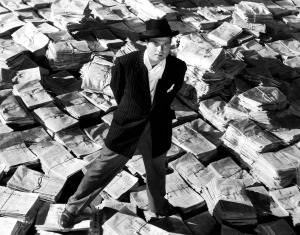 Curtis Hanson’s stylish neo-noir adaptation of James Ellroy’s novel paints a dark picture of the LAPD in the mid 1950’s depicting an organisation steeped in corruption and brutality.
Curtis Hanson’s stylish neo-noir adaptation of James Ellroy’s novel paints a dark picture of the LAPD in the mid 1950’s depicting an organisation steeped in corruption and brutality.
Trimming significant excess from the source the film follows three radically different L.A. detectives as they investigate a shooting at an all night diner. Jack Vincennes (Kevin Spacey) is a slick narcotics detective and technical advisor for a popular TV drama whose ‘movie star’ veneer masks a man whose sold out. Wendell “Bud” White (Russell Crowe) is a violent yet emotionally damaged homicide detective with his own moral code. Finally, Edmund Exley (Guy Pearce) is an ambitious, driven, by-the-book career cop whose detective father was killed on the job. Each detective investigates the shooting in their own way but soon their paths cross as they discover there’s more to this crime than they first thought and soon they become embroiled in a complicated plot of corruption, drugs, murder, and prostitution.
Ed Exley – All I ever wanted was to measure up to my father.
Bud White – Now’s your chance… he died in the line of duty, didn’t he?
Nominated for 9 Academy Awards (it won two – Best Actress in a Supporting Role, Kim Basinger, and Best Screenplay – Adapted) L.A. Confidential was universally acclaimed for both it’s stars and it’s visual style. Hanson and the films cinematographer, Dante Spinotti, studied many of the films of the era including The Bad and the Beautiful, In a Lonely Place, and The Tarnished Angels in order to achieve the right atmosphere however in order to avoid a feeling of nostalgia they shot like a contemporary film and used more naturalistic lighting than in a classic film noir.
Ultimately L.A. Confidential allows the hope of the period to shine through the gritty and rotten heart of it’s subject matter and draws the viewer in, engaging them, so that they become a part of the story. Whilst you may hate the main characters initially for their thuggish, uptight, or slick ways I defy you not to start to care about them as their story develops and they begin to evolve before your eyes.

